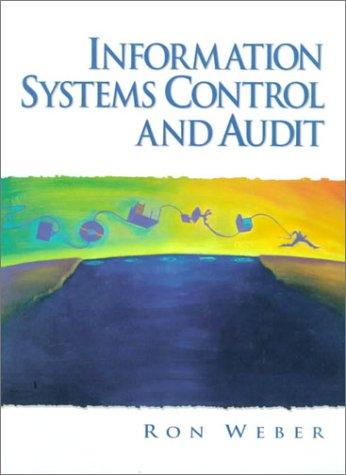Ferntree Products Limited (FPL) is a large New Zealand-based manufacturer of diverse products with headquarters in Auckland.
Question:
Ferntree Products Limited (FPL) is a large New Zealand-based manufacturer of diverse products with headquarters in Auckland. It uses information technology extensively to support all aspects of its operations. For example, it uses robotics throughout its manufacturing processes and distributed information systems to assist its widely dispersed sales force.
You are the manager of internal audit for FPL. One day you are called suddenly to a meeting with the general manager. When you arrive at the meeting, you find the information systems manager and the QA manager in attendance. The general manager explains that some difficulties have arisen with respect to some quality assurance strategies the information systems department is proposing to undertake in the future. In particular, he indicates that the information systems manager and the QA manager are proposing to change the way in which information systems standards and QA standards are formulated in FPL. He asks the information systems manager to elaborate.
The information systems manager explains that in the past information systems standards and QA standards have been formulated by a committee comprising representatives of all stakeholder groups potentially affected by the standards. In the case of QA standards, for example, the committee might comprise representatives from user groups as well as representatives from the information systems department. These committees are always chaired by the QA manager.
The information systems manager indicates that this committee process has broken down. She informs you that inevitably committee deliberations degenerate into bitter fights over the appropriate standards to adopt. As a result, poor-quality standards are produced, and important milestones for the production of standards are being missed. Relationships among professionals within the information systems department have deteriorated, and relationships with user groups also are not good. QA personnel are finding they can no longer work effectively with the IS staff or users because a lack of trust exists. Moreover, information systems staff are complaining about the uncertainty they face in the ways they must work. She then asks the QA manager to outline a solution they are proposing to adopt.
The QA manager explains that he and the information systems manager believe the committee structure used to develop standards should be terminated. He argues strongly that too much time is lost and that the whole process is unproductive. In its place, he indicates that he and the information systems manager believe the standards-development process should become the prerogative of the QA group. When standards must be developed or maintained, the QA manager and some of his group will seek the opinion of stakeholders, but ultimate responsibility for the standards adopted will be given to the QA manager.
The information systems manager then indicates she will require all her staff to comply with the standards. The reason for the current meeting is that they are seeking the support of the general manager to enforce compliance with standards by other groups throughout the organization.
Required. The general manager explains that he has some concerns about the standards-formulation process being proposed by the information systems manager and the QA manager. Nevertheless, he understands the difficulties associated with the current process, and he wants resolution of these difficulties. He asks your opinion on the proposed changes to the standardsformulation process. All eyes turn eagerly to you. What advice will you give your colleagues in the meeting?
Step by Step Answer:






